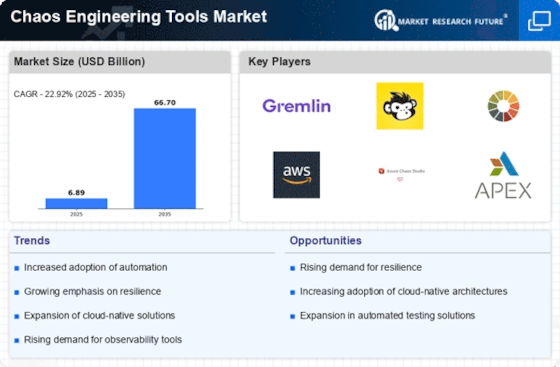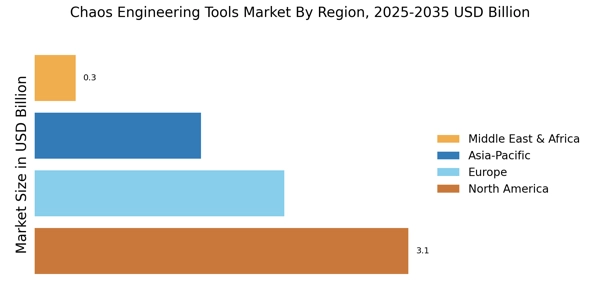Increased Focus on Cybersecurity
The heightened focus on cybersecurity is significantly influencing the Chaos Engineering Tools Market. As cyber threats become more sophisticated, organizations are compelled to adopt comprehensive strategies to safeguard their digital assets. Chaos engineering tools play a crucial role in this context by simulating various failure scenarios, including potential cyberattacks. By proactively testing system responses to these threats, organizations can identify weaknesses and implement necessary safeguards. This proactive stance is essential in an era where data breaches and cyber incidents can have devastating consequences. The chaos engineering tools market is projected to benefit from this trend, with an expected growth rate of around 20% annually as organizations prioritize security alongside operational resilience.
Integration with DevOps Practices
The integration of chaos engineering tools with DevOps practices is a significant driver within the Chaos Engineering Tools Market. As organizations strive for faster deployment cycles and improved collaboration between development and operations teams, chaos engineering emerges as a vital component. By incorporating chaos engineering principles into the DevOps pipeline, teams can identify potential failures early in the development process. This proactive approach not only enhances system reliability but also accelerates the delivery of high-quality software. The market is witnessing a shift towards tools that seamlessly integrate with existing DevOps frameworks, thereby facilitating a smoother adoption process. This trend is expected to contribute to the overall growth of the chaos engineering tools market, which is anticipated to expand at a robust pace in the coming years.
Growing Awareness of Systemic Risks
The growing awareness of systemic risks is emerging as a critical driver in the Chaos Engineering Tools Market. Organizations are increasingly acknowledging that failures in one part of a system can have cascading effects, leading to widespread disruptions. This understanding is prompting businesses to adopt chaos engineering practices to identify and mitigate these risks proactively. By simulating various failure scenarios, organizations can gain insights into potential vulnerabilities and develop strategies to enhance overall system resilience. The emphasis on systemic risk management is expected to propel the chaos engineering tools market forward, as more companies recognize the importance of safeguarding their operations against interconnected failures. This trend is indicative of a broader shift towards a more holistic approach to risk management in the digital age.
Rising Demand for Resilient Systems
The Chaos Engineering Tools Market is experiencing a notable surge in demand for resilient systems. Organizations are increasingly recognizing the necessity of maintaining operational continuity amidst unforeseen disruptions. This trend is driven by the growing reliance on digital infrastructure, which has become integral to business operations. As a result, companies are investing in chaos engineering tools to proactively identify vulnerabilities and enhance system robustness. According to recent estimates, the market for chaos engineering tools is projected to reach USD 1.5 billion by 2026, reflecting a compound annual growth rate of approximately 25%. This growth underscores the critical role that these tools play in ensuring system reliability and performance, thereby fostering a culture of resilience within organizations.
Adoption of Microservices Architecture
The shift towards microservices architecture is a pivotal driver in the Chaos Engineering Tools Market. As organizations transition from monolithic applications to microservices, the complexity of managing distributed systems increases. Chaos engineering tools are essential for testing the resilience of these microservices, allowing teams to simulate failures and assess system behavior under stress. This approach not only enhances the reliability of individual services but also ensures that the entire system can withstand unexpected disruptions. The adoption of microservices is expected to continue its upward trajectory, with a significant portion of enterprises embracing this architecture. Consequently, the chaos engineering tools market is likely to see substantial growth as organizations seek to optimize their microservices environments.

















